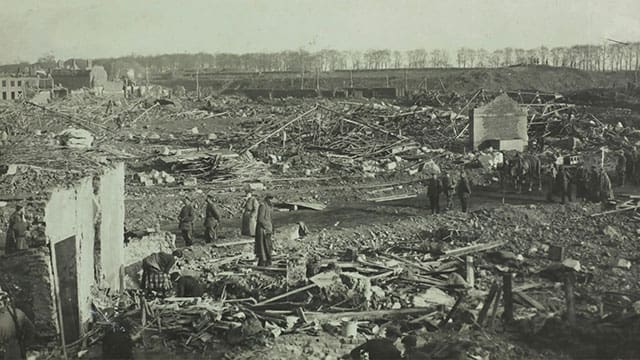Efforts to minimize civilian casualties in war are critical, yet the unpredictability of conflict often makes complete avoidance difficult
 The Wall Street Journal had an interesting article on June 6 that explicitly addressed a topic that often flies beneath the radar. It was about French civilian casualties in the Second World War. These losses weren’t inflicted by the occupying Germans, but rather by what we call friendly fire.
The Wall Street Journal had an interesting article on June 6 that explicitly addressed a topic that often flies beneath the radar. It was about French civilian casualties in the Second World War. These losses weren’t inflicted by the occupying Germans, but rather by what we call friendly fire.
It’s estimated that some 50,000 French civilians were killed by American and British bombing, most of them from 1943 onwards. The period around D-Day was particularly intense.
For instance, the town of Saint-Lo in Normandy – a German command centre with a train station and a garrison of 1,500 soldiers – was hit by American bombers on the evening of June 6, 1944. Although the Americans had dropped leaflets warning civilians to evacuate, they’d been dispersed by the wind. The consequent collateral damage was enormous.
One survivor described it this way: “Everything was on fire, people wailing, imprisoned in their basements – they couldn’t get out.” When the dust settled, the town was largely destroyed, and hundreds were dead.
The bombing campaign had been intensified in 1944 when the Transportation Plan set out to destroy France’s rail infrastructure. The idea was to disrupt Germany’s ability to move supplies and men around by hitting targets across the country.
Militarily, it was a perfectly logical thing to do, but the related French casualties and property destruction generated substantial and lingering resentment. For some people, the occupying Germans became the lesser villains.
As French president years later, Charles de Gaulle took a pass on the 20th anniversary D-Day commemorations. Because the Normandy landings were essentially an American, British and Canadian operation with only marginal involvement from his Free French forces, there was no French triumph for de Gaulle to celebrate.
This year, French President Emmanuel Macron sought to reconcile the conflicting perspectives by characterizing Saint-Lo as “the martyred city, sacrificed to liberate France.” Expressed in more general terms, Macron was noting that war is an inherently tragic thing and truly innocent civilians might perish in pursuit of a greater goal.
What happened in Germany was an entirely different kettle of fish. Friendly fire had nothing to do with it, and the devastation was far greater than in France. So much so, in fact, that people of goodwill came to see the general German population as victims.
This poses difficult and uncomfortable questions.
German civilian casualties undoubtedly included significant numbers of genuinely innocent people. Children, for instance, and those adults whose compliance with the regime was simply a consequence of its coercive dimension. But it’s implausible to deny that the Nazis enjoyed broad public support, including from young people and academics.
Nazism had a distinct communitarian ethos, centred on the concept of “people who are connected by blood, united by language, and subject to the same collective fate.” As long as you fitted into the appropriate racial/cultural template and got with the programme, you’d be well looked after materially, not to mention the psychological buoyance associated with the pull of the tribe.
Because you’re not wearing a uniform at a specific point in time, does that really make you an innocent civilian? Even if you’re actively working to support the war machine and providing aid and comfort to its soldiers?
Wrestling with this moral conundrum inevitably leads to asking about alternatives. However worthy, general observations about the futility of war and the need to preventively address root causes don’t entirely cut it. Sometimes, war comes looking for you.
There’s an argument that large-scale aerial bombardment should be abjured in favour of direct combat, even at the expense of greater troop casualties. After all, fighting, and maybe dying, is an inherent risk of being a soldier.
But most of the Allied soldiers tasked with defeating the Nazis hadn’t chosen military service as a career. Rather, they were mechanics, plumbers, carpenters, dentists and so forth, men whose military careers – should they survive – would conclude once the war was over. Why should their lives be considered less valuable than those of enemy civilians, many of whom were Nazi supporters?
John Tonkin was a British SAS officer who experienced the full gamut of Second World War action, ranging from North Africa to the invasion of Sicily to D-Day and its aftermath. He was also one of the first Allied officers to enter the Bergen-Belsen concentration camp in April 1945, a haunting experience which he found “totally unbelievable.”
It all left him with no illusions. To quote: “I have always felt that the Geneva Convention is a dangerous piece of stupidity because it leads people to believe that war can be civilized. It can’t.”
Troy Media columnist Pat Murphy casts a history buff’s eye at the goings-on in our world. Never cynical – well, perhaps a little bit.
For interview requests, click here.
The opinions expressed by our columnists and contributors are theirs alone and do not inherently or expressly reflect the views of our publication.
© Troy Media
Troy Media is an editorial content provider to media outlets and its own hosted community news outlets across Canada.


